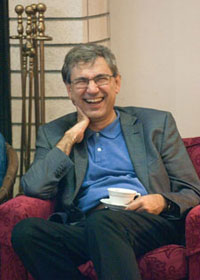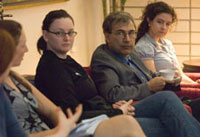


On October 12, 2006, from the upper floor of the Stockholm Stock Exchange Building, Professor Horace Engdahl, Permanent Secretary of the Swedish Academy, issued the following announcement: “The Nobel Prize in Literature for 2006 is awarded to the Turkish writer Orhan Pamuk, who in the quest for the melancholic soul of his native city has discovered new symbols for the clash and interlacing of cultures.” The city to which Engdahl refers is, of course, Istanbul, the historic metropolis once known as Byzantium and Constantinople, straddling the continents of Europe and Asia on the Golden Horn of the Bosphorus Strait.
Orhan Pamuk bestrides the very opposites of which Istanbul—factually, the city of his birth and memoirs; fabulously, the backdrop of his novels The White Castle, The Black Book, and My Name is Red—is emblematic: history and modernity, tradition and innovation, Islam and Christianity, folkishness and urbanity, provincialism and empire. “A writer,” said Pamuk in his Nobel acceptance speech, “is someone who spends years patiently trying to discover the second being inside him, and the world that makes him who he is … The writer’s secret is not inspiration—for it is never clear where it comes from—it is his stubbornness, his patience. … If I think back on the books to which I have devoted my entire life, I am most surprised by those moments when I have felt as if the sentences, dreams, and pages that have made me so ecstatically happy have not come from my own imagination—that another power has found them and generously presented them to me.”
Could that other power that so magnanimously presented these gifts to Pamuk—and to us—be the paradox that is, and since Constantine’s victory over Licinius has been, Istanbul? By conferring for the first time upon a Turkish writer the supreme accolade in world literature, the Swedish Academy has affirmed the monumental status of Orhan Pamuk’s achievement, and assured it a prominent and lasting place amid the mosques, obelisks, and towers that bejewel the cityscape of the venerable municipality on the Bosphorus.
